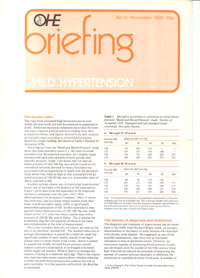The risks from untreated high blood pressure at even mildly elevated levels are well documented in quantitative terms. American insurance companies have since the interwar years…
The risks from untreated high blood pressure at even mildly elevated levels are well documented in quantitative terms. American insurance companies have since the interwar years required a blood pressure reading from their prospective clients, and figures derived from their analysis of mortality…
The risks from untreated high blood pressure at even mildly elevated levels are well documented in quantitative terms. American insurance companies have since the interwar years required a blood pressure reading from their prospective clients, and figures derived from their analysis of mortality rates according to initial blood pressure, based on a single reading, are shown in Table 1 (Society of Actuaries 1959).
These figures from the ‘Build and Blood Pressure’ study show that male mortality ratios (i.e. the ratio of actual mortality over the expected mortality for a healthy man) increase with each step upwards in both systolic and diastolic pressure. Table 1 (b) shows that for men an initial pressure of 162/100 Hg mm (which would not be considered seriously elevated by many clinicians) was associated with an expectation of death over the period of study about four times as high as that associated with an initial pressure of 120/80 Hg mm (i.e. a mortality ratio of 300 as opposed to 80).
Another perhaps clearer way of expressing hypertensives’ excess risk of mortality is by analysis of life expectation. Figure 1 gives data from the experience of 26 American insurance companies over the years 1935-1954. (Metropolitan Life Insurance Company, 1961). It shows that both men, and to a lesser extent women (with their lower overall mortality rates), suffer a significantly diminished expectation of life. In this experience a man aged 45 with a blood pressure of 150/100 Hg mm could expect to live 11½ years less than a similar man with a pressure of 120/80 Hg mm or below. This is despite the probability that the vast majority of those in the study were symptomless at the time of measurement.
The excess mortality does not, of course, all come at the end of an otherwise ‘normal life’. The marked reduction in average life expectancy is caused by a relatively small but significant number of early deaths, mainly from heart disease and to a lesser extent from stroke. Hence it cannot be argued that mildly elevated blood pressure merely reduces a person’s expectation of prolonged retirement (which might not matter). What it does is to increase his chances of dying at a relatively early age. That is the reason why there has been recent concern about whether reducing a mildly elevated blood pressure also reduces the risk of early mortality. It is that question with which this Briefing is concerned.
